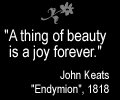| The first exhibition of the Bag One series following the death of John Lennon was held at the Daytona Beach Museum of Arts and Sciences from September 11 through November 22, 1981. Following is the forward from the exhibit catalogue written by Gary Russell Libby, Director of the Museum. |
"If art were to redeem man, it could do so only by saving him from the seriousness of life and restoring him to an unexpected boyishness." - John Lennon, 1968 THE LITHOGRAPHS In many ways John Lennon was truly a renaissance man whose insight and perspective helped shape the sensibility of the contemporary mind. While music will certainly be remembered as his most popular art form, he was keenly interested in and loved both his literature and his art, studying from 1957-1960 at Liverpool Art Institute.As early as 1968 Lennon began moving toward a return to visual art, which had been a preoccupation during his childhood and adolescence. While Lennon painted at the time in a traditional way, no major work from that period has come down to us. He was primarily interested in drawing and favored the creative loose sketch. The lithographs exhibited here were produced from drawings done in two periods from 1968 to 1969. Twelve images, from hundreds drawn, were selected by Lennon biographer Anthony Fawcett and producer-agent Ed Newman, who had already worked with Man Ray, Dali, Henry Moore and other prominent contemporary artists. After an initial discussion with Picasso's lithographer, the Crommylynck Brothers in Paris, Newman decided to use the London-based Curwen Studio to proof the twelve images plus a title page and impression of a Lennon alphabet poem which would serve as an introduction to the edition of three hundred sets of 14 lithographs each. They were produced using a specially treated litho stock, which allowed Lennon to draw on paper in his usual manner. The images were then transferred from the paper onto sensitized zinc plates, and then printed in the traditional way. Ted Lapidus, Paris' foremost clothing designer, produced a handsome white leather carrying satchel for the edition. While in Toronto . . . visiting with Prime Minister Pierre Trudeau, Lennon personally signed all 3,000 finished prints in the living room of rockabilly singer and friend, Ronnie Hawkins.The Bag One series was first publicly exhibited in January of 1970 at the London Art Gallery on New Bond Street. The price was 550 pounds sterling for the set of 14. On the second day the exhibition was closed by Scotland Yard, with the eight erotic lithographs confiscated as "indecent." Several months later, after a lengthy trial and investigation, the case was dismissed. Lennon's American opening was on February 6 in New York City. Shortly thereafter, Avant Garde magazine featured one of the lithos on its cover and more in an accompanying article. John and Yoko planned a second "collaborative series" based on the Chinese I Ching, or Book of Changes, but the project was never completed. Just recently, John Lennon posthumously received the Handel Medallion, New York City's most prestigious cultural arts award. The Bag One lithographs have been called spontaneous and tender figurative images which, taken together, celebrate John's love for Yoko and their life together. While they tend to remind one of Matisse or even Picasso, they speak to us in a unique language of their own. Lennon's skill is expressed in a smooth, flowing, almost voluptuous line where both positive and negative areas sing with a celebration of the event which is depicted. While they are certainly significant as the only graphic work by one of the most important cultural figures of our time, they are also important as works of art which celebrate human love and communication — two themes at the hearth of John Lennon's contribution to the art of the twentieth century. The museum would like to thank Mr. Aubrey Pruet for the initial idea of exhibiting the Bag One lithographs, and for his cooperation and help in this first exhibition of the work since the death of John Lennon. Special thanks go to Mr. Nicholas J. Sands, one of New York's most important Lennon collectors, for the use of photographs and documents reproduced here. Additional thanks go to J. Robert LeShufy, Esq., publisher of the lithographs, for his help in this project. Reproduced with permission of the author. |
|
|
For more information about
our fine art, please contact us at |

